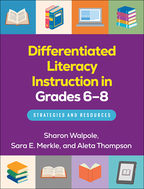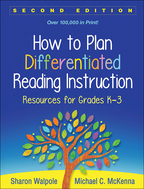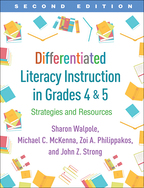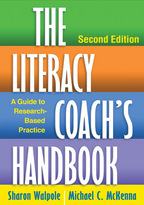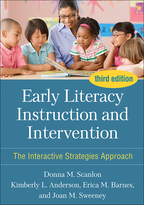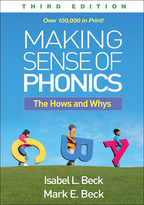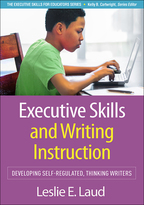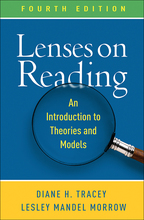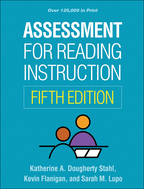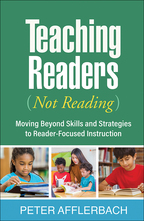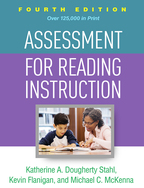Differentiated Literacy Instruction in Grades 6-8
Strategies and Resources
Sharon Walpole, Sara E. Merkle, and Aleta Thompson

- A Design Opportunity
- The Need for Evidence-Based Knowledge Building
- The Role of Text Sets
- Deciding to Center Students
2. Middle School Students and Their Teachers
- What Do We Want Middle School Students to Know and Be Able to Do?
- Demographics and Achievement
- Defining Adolescent Readers
- Serving Middle School Teachers
- Positioning Curriculum
3. Feasible Differentiation in Middle School
- Early Leaders in Differentiation
- Persistent Questions
- So, Is Differentiation Feasible and Effective?
- The Need for a Change
- Curriculum in the Mix
4. Choosing Anchor Texts and Building Text Sets
- Reading Comprehension and Text Representation
- Building Background Knowledge through Quad Text Sets
- Selecting Anchor Texts
- Text Complexity
- Quantitative Complexity
- Qualitative Complexity
- Readers and Tasks
- Quad Texts in Action
- Try It Yourself!
5. Planning for Equity
- Achievement Gap
- Culturally and Linguistically Sustaining Pedagogy
- Culturally Responsive–Sustaining Education Framework
- CRSE Guidance for ELA Instructional Solutions
- Culturally Responsive Curriculum Scorecard
- Using Outside Readers
- Beyond a Single Story
- Try It Yourself!
6. Routines for Knowledge Building
- Starting with Evidence
- Addressing Standards
- Identifying Affordances for Teaching with Text
- Instructional Routines for Building Topic and Vocabulary Knowledge
- Opportunities for Differentiation
- Try It Yourself!
7. Routines for Reading
- Starting with Evidence
- Addressing Standards
- Identifying Affordances for Teaching with Text
- Creating a Robust Sequence of Steps in a Lesson
- Instructional Routines for Reading the Anchor Text
- Instructional Routines for Reading Text Sets
- Building Challenge over Time
- Opportunities for Differentiation
- Try It Yourself!
8. Routines for Discussion
- Starting with Evidence
- Addressing Standards
- Identifying Affordances for Teaching with Text
- Creating a Robust Sequence of Steps in a Lesson
- Instructional Routines for Targeted Discussions
- Building Challenge over Time
- Opportunities for Differentiation
- Try It Yourself!
9. Routines for Grammar and Language
- Starting with Evidence
- Addressing Standards
- Identifying Affordances for Teaching with Text
- Creating a Robust Sequence of Steps in a Lesson
- Instructional Routines for Grammar and Language
- Building Challenge over Time
- Opportunities for Differentiation
- Try It Yourself!
10. Routines for Writing
- Starting with Evidence
- Addressing Standards
- Creating a Robust Sequence of Steps in a Lesson
- Instructional Routines for Teaching Writing
- Modeling the Writing Process
- Guiding Students to Revise
- Modeling the Revision
- Feedback
- Building Challenge over Time
- Opportunities for Differentiation
- Try It Yourself!
- 11. Routines for Research
- Starting with Evidence
- Addressing Standards
- Creating a Robust Sequence of Steps in a Lesson
- Instructional Routines for Research
- Instructional Routines for Presenting Information
- Building Challenge over Time
- Opportunities for Differentiation
- Try It Yourself!
12. Routines for Assessment
- Starting with Evidence
- Addressing Standards
- Model–Practice–Assess Assessment Series
- Try It Yourself!
- Comprehension Assessment
- Try It Yourself!
- Culminating Tasks
- Try It Yourself!
13. Changing the Status Quo in Middle School
- Try It Yourself!
References
Index

